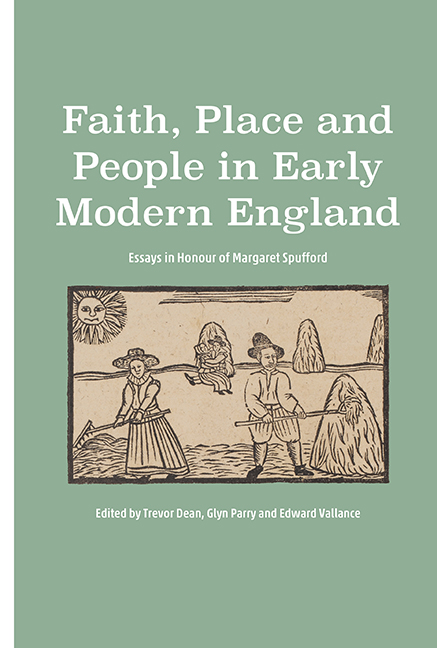Introduction
Published online by Cambridge University Press: 19 July 2019
Summary
When Margaret Spufford published Contrasting Communities in 1974, it appeared to be another example of the ‘anthropological turn’ in history, the attempt to recover lost cultures and belief systems that had inspired E. P. Thompson's The Making of the English Working Class (1963) and Keith Thomas's Religion and the Decline of Magic (1971). Yet while the sheer ambition of Thompson's and Thomas's monumental achievements partly explains why they founded no methodological ‘school’, Spufford's ostensibly more focused attempt at recovering the religious beliefs of Cambridgeshire villagers has inspired two generations of historians, many of them her own graduate students, to develop her mixture of economic and social methods with the political and ecclesiastical in increasingly fruitful ways. This impressive legacy is demonstrated by the essays in this volume, which span social, economic, religious and cultural history. The product of Spufford's former students, academic collaborators and peers, they offer powerful testimony of her ongoing contribution to the study of early modern history. In this volume, we have organised these contributions around three themes that we see as critical to Margaret Spufford's work: faith, place and people.
Faith
The three distinguished historians who have contributed to this part share Spufford's attention to the significant details of local records, as well as noticing their significant silences, and her alertness to the lived religious experience at the parochial level, which so often forces us to revise our assumptions about national religious culture. Much previous historiography on the English Reformation had analysed clerical debates and elite expressions of religious opinion, or made broad statements about an implicit conflict between the prosperous ‘godly’ and the ignorant, easy-going religious beliefs of the poorest. However, Contrasting Communities sought to recover the thoughts and feelings of villagers as sentient individual humans. Since the ecclesiastical courts concerned themselves with the behaviour of the laity, not their opinions, Spufford's search for individuals dissenting against moral and doctrinal pressures had to use inventive methods to overcome the inherent limitations of official sources. Thus she was an early pioneer of ‘reading against the grain’, drawing attention to the silences in the documents, as Steve Hindle does in his chapter in this part.
- Type
- Chapter
- Information
- Faith, Place and People in Early Modern EnglandEssays in Honour of Margaret Spufford, pp. 1 - 14Publisher: Boydell & BrewerPrint publication year: 2018



